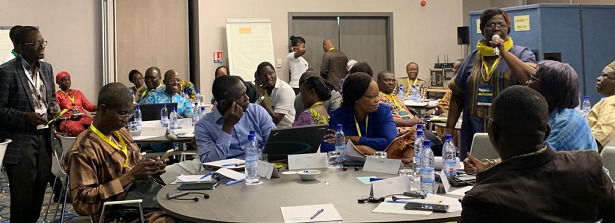Benin Applied Research Fund workshop: Result uptake and scaling opportunities

”We need a paradigm shift to involve unusual suspects in research partnerships to foster the scaling of research and innovation on food and nutrition security”, was one of the conclusions during the Food & Business Applied Research Fund (ARF) country workshop in Benin. Representatives of eleven Beninese ARF projects gathered in Cotonou from November 20 to 22, 2019 to take stock of lessons learned and outcomes and to jointly reflect, learn and work on further uptake of results.
The workshop was organized by NWO-WOTRO Science for Global Development, the Faculty of Agronomic Science of the University of Abomey-Calavi, the Food & Business Knowledge Platform (F&BKP) and AgriProFocus Benin. The eleven projects were represented by professionals from
research, private sector, NGOs and governmental agencies. Since around half of the projects has been finalized, while the other half is about to be, time had come to take stock of lessons learned and outcomes, and to jointly reflect, learn and work on further uptake of results. Besides, for sustainability of research results, the participants discussed issues related to scaling opportunities and strategies. The main theme of the workshop was therefore: “Scaling for Impact: ARF results for strengthening Benin Food & Nutrition Security in policy and practice”. The workshop consisted of an internal ARF project day, a public day with Food and Nutrition Security stakeholders from Benin, and a field trip. Via interactive sessions, including project pitches, breakout sessions, World Café Carousel, an Open Space session and a panel discussion, knowledge, lessons and ideas were exchanged and discussed.
The Benin ARF projects
Out of the 45 ARF projects, eleven have been implemented in Benin from 2014 onwards. Six of them have been finalized, the other five are about to. As all ARF projects, the Benin projects aim to contribute to food security and private sector development by demand driven and innovative research. This is done by a multi-stakeholder collaboration approach with a strong focus on innovations that are developed and implemented in interaction with end users. Most of the Benin projects focus on the improvement of the production, value chain and promotion of (African indigenous) food and crops, such as Kersting’s groundnut, pineapple, Moringa leaves, soy bean, rice, plantain, dye sorghum and spider plant. Other research focusses on improvements of mother and child nutrition, inland fisheries and fish feed.
Lessons learned, indigenous foods and first discussions on scaling
During the first workshop day, the morning session focussed on indigenous foods and local food systems. Since quite a number of projects is working on indigenous foods, the consortium representatives discussed key lessons and innovations, main barriers, and how to overcome these barriers in order to scale the new innovations. During the afternoon, a World Café Carousel was organized to discuss three main issues: research impact assumptions; public-private partnerships; and scaling out, up and deep. Based on their own experiences, expertise but also knowledge gaps, the participants had a lively discussion about these issues.
Strengthening Benin Food and Nutrition Security in policy and practice
The second day, the ARF representatives were joined by a great number of stakeholders from the agrofood sector in Benin, to learn about the ARF projects results and further discuss issues related to scaling opportunities and strategies. Frejus Thoto, director of ACED Benin, part of the ARF research consortium on inland fisheries, provided the keynote speech of the day. In his speech he addressed three lessons learned: 1) Local and central government have transformative power and should be actively involved in scaling of innovations; 2) The private sector, an unusual suspect, should be involved since approaches are more sustainable when driven by a business case; 3) Brokers, the intermediaries between researchers and end users, are important to digest and translate complex knowledge into assimilable messages. The afternoon was fully dedicated to an Open Space session. Based on discussions of the previous day, eight statements for sub-sessions were composed, all with a focus on scaling, including the accessibility and ownership of research findings, collaborations needed for scaling, nutrition-sensitive scaling and strengthening existing platforms to be inclusive of all voices. The day was concluded with a panel discussion.
Field trip
The last day of the workshop was a field trip organized by the DAPIS project that aims to improve the quality of pineapples and pineapple juice for national and international markets. The day started with a visit to a pineapple field where agronomic practices are being improved, resulting in higher yields and better quality pineapples. The next stop was at the local market, where participants eagerly tried the tasty pineapples and witnessed part of the transportation process. The day ended with a demonstration at a processing centre where new processing techniques are being used for juice making.
Conclusion
The workshop defined three drivers for scaling-up of results and innovations of research projects. The first driver is the public sector, whose role is to create an enabling environment. They should be actively involved in the scaling process and its awareness raised among the actors. The second driver is the private sector, whose involvement in Benin national research systems has so far been limited, both in terms of investment and use of research outcomes. Strategies should be clearly defined to involve the private sector, since this will increase the sustainability of innovations and the number of people reached. The last driver are the intermediaries, also named brokers, who bridge the key actors and can facilitate strong collaboration between research, policy, private sector and civil society. It is urgent to stimulate the development of a collaborative framework favouring intervenors in agriculture to work together throughout the whole project cycle, starting from problem identification.





